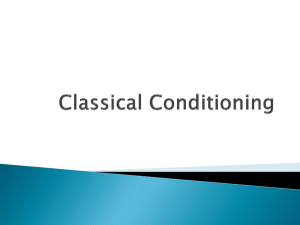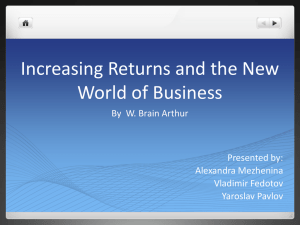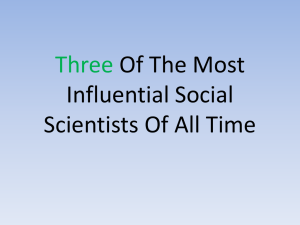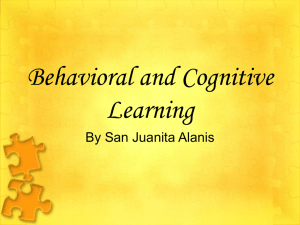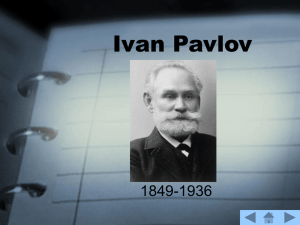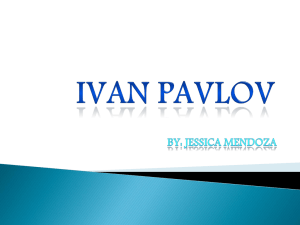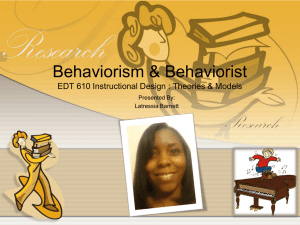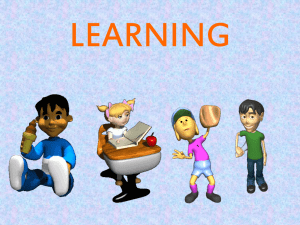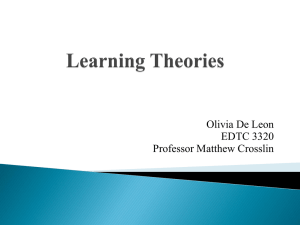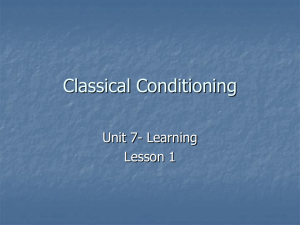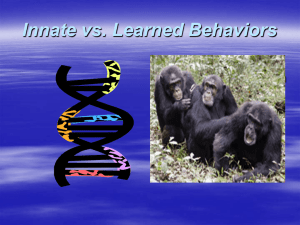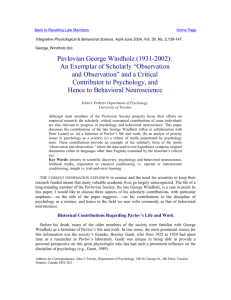Ivan Pavlov - manuel
advertisement
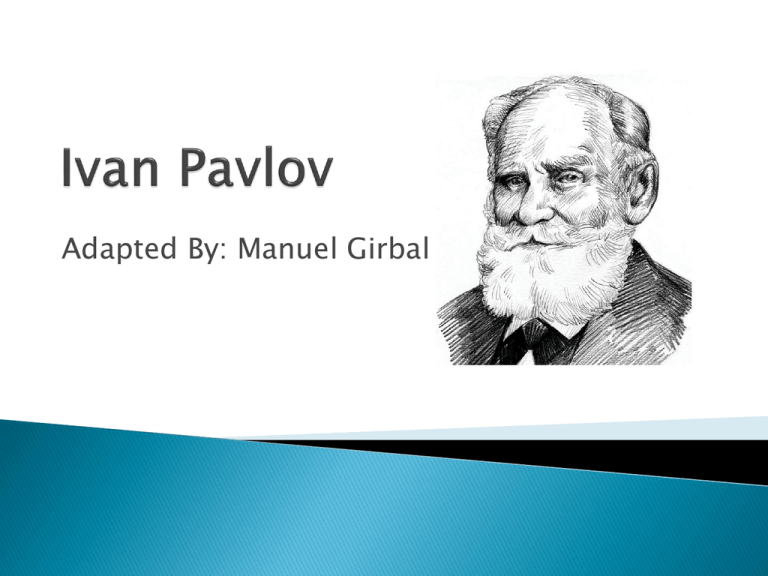
Adapted By: Manuel Girbal Background Born September 1849 Ryazan, Russia He began his higher education as a student at the Ryazan Ecclesiastical Seminary, but then dropped out and enrolled in the University of Saint Petersburg to study the natural sciences and become a physiologist. He received his doctorate in 1879. Ivan Petrovich Pavlov was born on September 14, 1849 at Ryazan, where his father, Peter Dmitrievich Pavlov, was a village priest. He was educated first at the church school in Ryazan and then at the theological seminary there. In 1870 Ivan Pavlov abandoned the religious career for which he had been preparing, and instead went into science. There he had a great impact on the field of physiology by studying the mechanisms underlying the digestive system in mammals. Pavlov became passionately absorbed with physiology, which in fact was to remain of such fundamental importance to him throughout his life. For his outstanding work in the field of physiology he was nominated to the Nobel Prize in 1904. When he was giving his speech, he said something that impressed the audience. Pavlov talked about his “conditional reflexes.” In 1850, Pavlov was asked to run the “Department of Physiology at the Institute of Experimental Medicine.” Here Pavlov would conduct his most important and significant research, and also he would remain here too (psychology). “Experiments carried out by Pavlov and his pupils showed that conditioned reflexes originate in the cerebral cortex, which acts as the «prime distributor and organizer of all activity of the organism» and which is responsible for the very delicate equilibrium of an animal with its environment.” Pavlov nurtured a great school of physiologists, which produced many distinguished pupils. He left the a scientific legacy of a brilliant group of pupils, who would continue developing the ideas of their teacher. In 1881 he married Sara Karchevskaya. They had three sons; Vladimir, Victor and Vsevolod, one of whom became a well recognized physicist professor. Pavlov continued his research and work on conditioned reflexes until his death, February 27, 1936. At First, Pavlov was investigating what was the purpose of salivation during digestion. He did this by externalizing a salivary gland so he could collect, measure, and analyze the saliva and what response it had to food. Pavlov started to notice that after some time, the dogs would start to salivate before the food was brought to them. Pavlov noticing this and deduced that when the dogs heard the assistant coming with the food they would start to salivate because they had learned to associate the assistant coming with their food. After Pavlov realized that completing the real purpose of his experiment he decided to study the psychic secretion. This gave him other answers better than what he was originally set out to look for. He ended up with what we know as “Pavlov’s Dog.” After many attempts on trying to stop the dog from salivating before the food came, Pavlov tried to isolate the sound of the assistant coming with food. After many attempts of isolating the sound with different methods like a metronome or a bell he discovered another pattern. He realized that dogs had now associated the bell with the assistant and the food as well. Noticing this Pavlov decided to go along the lines of the Psychic process that would be going on with the dogs. He decided that this was more interesting than the chemistry of saliva, and changed the focus of his research, carrying out a long series of experiments in which he manipulated the stimuli occurring before the presentation of food. Apart from finding that saliva was of importance to the digestive process he also noticed that dogs that had been familiarized with the pre-feeding exercises in his research facility, but also began to salivate apparently in association with pre-feeding routines. In order to validate his point on classical conditioning Pavlov had to feed his dogs in association to the sound of a bell ringing. After a certain time dogs had learned to salivate with the sound of the bell without sight or smell of the food. “If a stimulus that results in an emotional response is repeated alongside another stimulus which does not cause an emotional response, eventually the second stimulus will result in the same emotional response. Classical Conditioning is thus ‘learning by association’.” Pavlov states that we are pre-determined to unconditionally to respond to different types of stimuli. For example, when we hear a sudden loud noise our unconditioned response is to flinch. This is what Pavlov means by unconditioned response, in other words an innate reaction. The typical procedure for inducing classical conditioning involves presentations of a neutral stimulus along with a stimulus of some significance. The neutral stimulus could be any event that does not result in an overt behavioral response from the organism under investigation. The unconditioned response will have an innate response or the unconditioned response. This will eventually Become into a condition Stimulus and response. http://www.youtube.com/watch?v=CpoLxEN54ho http://www.youtube.com/watch?v=IbMxYOdRnPI http://en.wikipedia.org/wiki/Classical_conditioning#Pavlov.27s_experiment http://nobelprize.org/educational_games/medicine/pavlov/readmore.html http://www.ivanpavlov.com/ http://nobelprize.org/nobel_prizes/medicine/laureates/1904/pavlovbio.html http://www.psywww.com/intropsych/ch05_conditioning/pavlovs_dog.html http://en.wikipedia.org/wiki/Classical_conditioning#Pavlov.27s_experiment http://en.wikipedia.org/wiki/Ivan_Pavlov#Reflex_system_research http://changingminds.org/explanations/theories/classical_conditioning.htm
